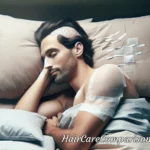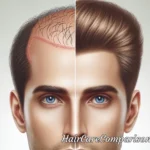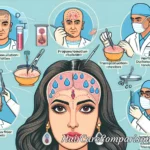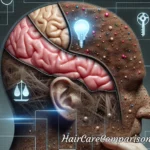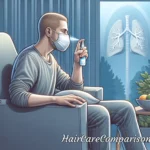With the increasing popularity of Follicular Unit Extraction (FUE) as a solution for hair loss, understanding post-operative care is crucial for ensuring the success of the transplant. Among various factors that influence the outcome, sun exposure stands out due to its potential risks. This article delves into the dangers of sun exposure for FUE transplants and offers guidance on how to safeguard your new hair grafts.
The Importance of Protecting FUE Transplants from the Sun
After undergoing an FUE transplant, the scalp becomes highly sensitive and vulnerable to external factors, particularly UV rays from the sun. Unprotected exposure can not only damage the transplanted follicles but also prolong the healing process. Understanding the risks and taking preventive measures is paramount for a successful recovery.
Immediate Risks of Sun Exposure Post-FUE
Direct sunlight on a freshly operated scalp can lead to various immediate complications. These include sunburn, which can exacerbate scalp inflammation and significantly hinder the healing process. Moreover, UV radiation can impair the growth of newly transplanted hair follicles, risking the overall success of the transplant.
Long-term Consequences of Sun Damage
Increased Risk of Scarring
Exposure to the sun soon after an FUE transplant can increase the likelihood of noticeable scarring. While FUE is known for leaving minimal scars, sun damage can disrupt the healing process, making any marks more pronounced.
Potential for Hair Transplant Failure
Long-term sun exposure without adequate protection can lead to hair transplant failure. The UV rays can weaken the newly transplanted follicles before they have fully taken root, resulting in less successful outcomes.
Protective Measures Against Sun for FUE Patients
Wearing Protective Gear
One of the simplest ways to protect your scalp post-transplant is by wearing hats or scarves when going out. Ensure that the material is light and breathable to avoid sweating, which can also affect the healing process.
Using Sunscreen on the Scalp
Applying a high SPF sunscreen designed for sensitive skin can provide an additional layer of protection once the initial healing phase has passed. However, it’s essential to consult with your surgeon on the most appropriate time to start using sunscreen post-surgery.
Avoiding Direct Sunlight During Peak Hours
Staying indoors or seeking shade during peak sun intensity hours, typically between 10 AM and 4 PM, can significantly reduce the risk of sun damage to your transplant.
Understanding the Impact of Lifestyle on FUE Transplant Success
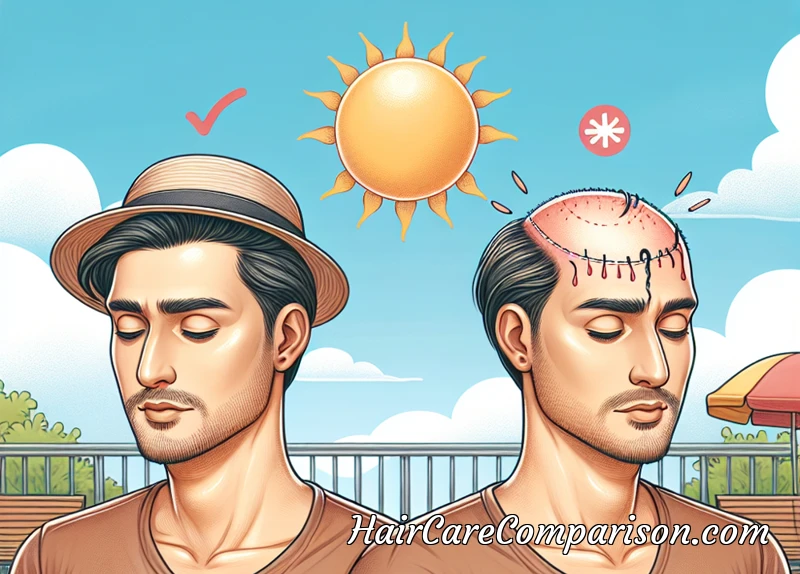
While protecting your transplant from the sun is crucial, it’s also important to consider how lifestyle factors can affect recovery and growth. Smoking, for instance, can impede the healing process and compromise the success of the transplant. For more in-depth information, explore the risks of smoking post-hair transplant.
Longevity of FUE Transplants: Combating Aging Effects
As with natural hair, transplanted follicles are not immune to the effects of aging. However, understanding the aging effects on hair transplants can help you take proactive steps to maintain the health and appearance of your transplanted hair over time.
Additional Considerations for FUE Transplant Aftercare
Beyond sun protection, proper aftercare following an FUE transplant involves multiple facets, from choosing the right hair care products to knowing when it’s safe to resume physical activities. Notably, patients are advised to avoid sexual activity shortly after their procedure to prevent complications. For a comprehensive guide, refer to the article on reasons for sexual activity avoidance post-transplant.
Choosing the Right Hair Source for Your Transplant
Selecting a suitable hair source is another critical aspect of ensuring the success of your FUE transplant. Whether using your own hair or considering a donor, the quality and compatibility of the hair can significantly impact the final result. Learn more about hair sourcing for transplants.
Conclusion
Protecting your scalp from sun exposure after an FUE transplant is essential for ensuring the best possible outcome. By understanding the risks and implementing protective measures, you can significantly enhance the healing process and longevity of your transplanted hair. Remember, a successful transplant is not just about the surgery itself but also how well you care for your scalp and hair post-operation. Consult with your surgeon for personalized advice and follow their recommendations closely for optimal results.


